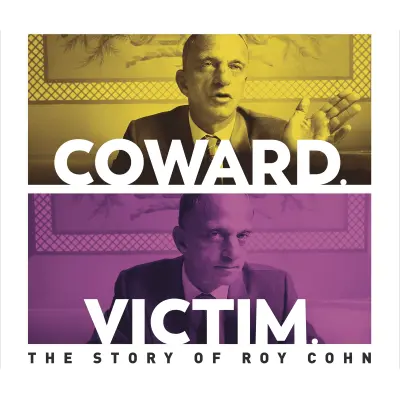Bully. Coward. Victim. The Story of Roy Cohn is as stuffed and jumbled as its title’s punctuation
-

HBO's documentary film on Roy Cohn from filmmaker Ivy Meeropol, whose grandparents Ethel and Julius Rosenbergs were executed largely due to Cohn, "uses her family connection to tether the fury of an otherwise wide-ranging, fist-shaking, grave-spitting affair," says Jacob Oller. He adds: "Most of the film isn’t relitigating atomic spies. Meeropol’s three-way ping-ponging interests of Cohn’s legal escapades, his barely closeted social life, and his legacy as it lives on through Trump often bounce off the table and scatter around the room. Rarely intersecting, these qualities pop up eclectically before the film grows tired of them and, remembering the other points it wants to make, tosses them aside. Bully. Coward. Victim. is so caught up in regaling us with the full breadth of Cohn’s lifelong d*ckishness that it never finds a full picture of a man amidst his actions."
ALSO:
- Bully. Coward. Victim. shows the damage that damaged people can cause: "If the movie tends to dart around (Roy) Cohn as a subject rather than fully expose him, it captures in emotional detail the enduring chaos and grief he inflicted on others," says Sophie Gilbert, adding: "If Bully. Coward. Victim. has a message, it’s this: Frailty comes for everybody in the end, and the cost of habitually disdaining loyalty and respect is seeing how quickly people disappear when they no longer fear you."
- Bully. Coward. Victim. is often not the film you would expect: "Cohn was a paradox, and so is this documentary — a brisk, entertaining, quite full primer that nevertheless feels like it missed an opportunity for a unique angle or approach," says Ben Kenigsberg, adding that the film presents a more sympathetic view of Cohen than his reputation or Meeropol's familial animosity would suggest.
- Trump's election prompted Ivy Meeropol to make her Roy Cohn documentary: “At first, I really didn’t want to make a film about Roy Cohn, because I felt like I’d delved into my family’s story enough, and I didn’t really relish returning to that topic,” she says. “That made me resistant to tackling his story, even though I was fascinated and compelled by him and I certainly had this unique perspective. But once I did decide to embark on this project, which was a result of Trump’s election – that’s what made me decide to do this – then I did start to feel like this might be an extension of my earlier work.”
- Meeropol didn't want the film to be seen as revenge for her grandparents' execution: “I am aware that people might think this is the Rosenberg revenge, which is what I didn’t want," she says. "My approach was to hear people’s stories and to give them the microphone."
TOPICS: Bully. Coward. Victim: The Story of Roy Cohn, HBO, Ivy Meeropol, Roy Cohn, Documentaries
